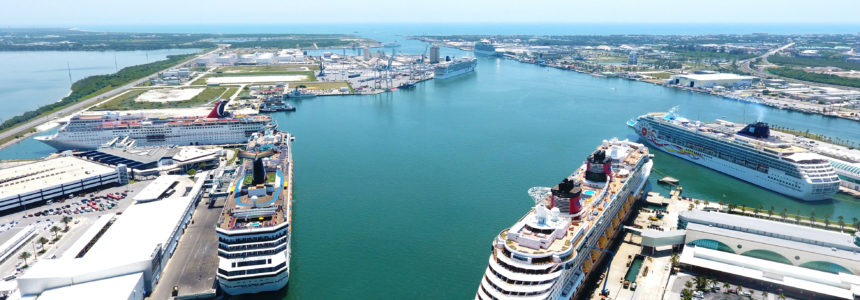News & Updates
Port Canaveral a powerful economic engine for Florida, new study shows

Port Canaveral’s significant growth is boosting its economic impact across Florida.
A new study shows the Port’s operations contributed $3.85 billion, 32,650 jobs, $1.3 billion in wages and an estimated $107.2 million in tax revenues to the Sunshine State in 2018. According to Business Research and Economic Advisors (BREA), authors of the Canaveral Port Authority-commissioned study, activity across all business lines generated $1.94 billion in direct impact on the Central Florida economy, which contributed to the direct employment of more than 17,200 workers who earned $729.4 million in annual wages.
From its cruise segment alone, the world’s second busiest cruise port generated $1.3 billion in economic impact, supporting 12,964 regional jobs paying $516.6 million in wages. Some 2.1 million guests embarked on multi-day cruises from the Port in 2018, helping the Port account for about 16 percent of total U.S. embarkations.
“We have long appreciated the significant role our business lines and all operations bring about in helping to grow the local and regional economies,” Port CEO Captain John Murray said. “This new study further substantiates the significant impact and accountability we have in support of the many firms, businesses, and employees directly related to our Port.”
Central Florida’s premier maritime gateway again set several new records during Fiscal Year 2019. The Port earned $110 million in total revenues from all business segments, a 6 percent increase over 2018. Cruise revenues totaled $81.9 million, up 5 percent from 2018. Cargo tonnage also rose to 6,487,769 tons, slightly above 2018 levels.
The solid financial numbers come as the Port is less than a year away from becoming the first North American homeport for a cruise ship powered by cleaner-burning LNG. Carnival Cruise Line’s Mardi Gras will arrive Oct. 15, 2020, at the Port’s new Cruise Terminal 3, currently under construction and scheduled to open July 15, 2020. The $163 million terminal project is the largest in the Port’s 66-year history.
To prepare for the arrival of the groundbreaking, 180,000-ton cruise ship, the Port is offering firefighters, shipboard personnel and LNG operators advanced training at an expanded LNG training facility at Port Canaveral’s state-of-the-art Maritime Firefighting Academy.
“With Port Canaveral’s significant growth in the past few years and next year’s arrival of the first LNG-powered cruise ship to homeport in North America, we made the proactive move to upgrade our firefighting training and emergency response resources,” Murray said. “The courses offered in our academy, combined with our new fireboat will greatly enhance the core capabilities of our first responders to ensure the safety and security of our Port.”
During the first quarter of 2020, the Port will receive the first articulated tug-barge in the U.S. built to deliver LNG to ships and ports. The 324-foot-long Q-LNG 4000 and its tug, the Q-Ocean Services, will carry 4,000 cubic meters of LNG to the Port for the Mardi Gras, then return to an LNG facility near Savannah, Ga., to refuel.
The Port Authority also has ordered a high-tech fireboat designed and purpose-built to provide enhanced marine firefighting and rescue capabilities for the Port’s growing maritime operations and expanding space enterprises in the region. The 65-foot-long Marine Firefighting Rescue Vessel will be equipped with conventional and dry-chemical firefighting apparatus.
As Port Canaveral looks ahead to a historic 2020, the Port remains committed to focusing on serving its business lines and providing a memory-making experience for customers and guests.
